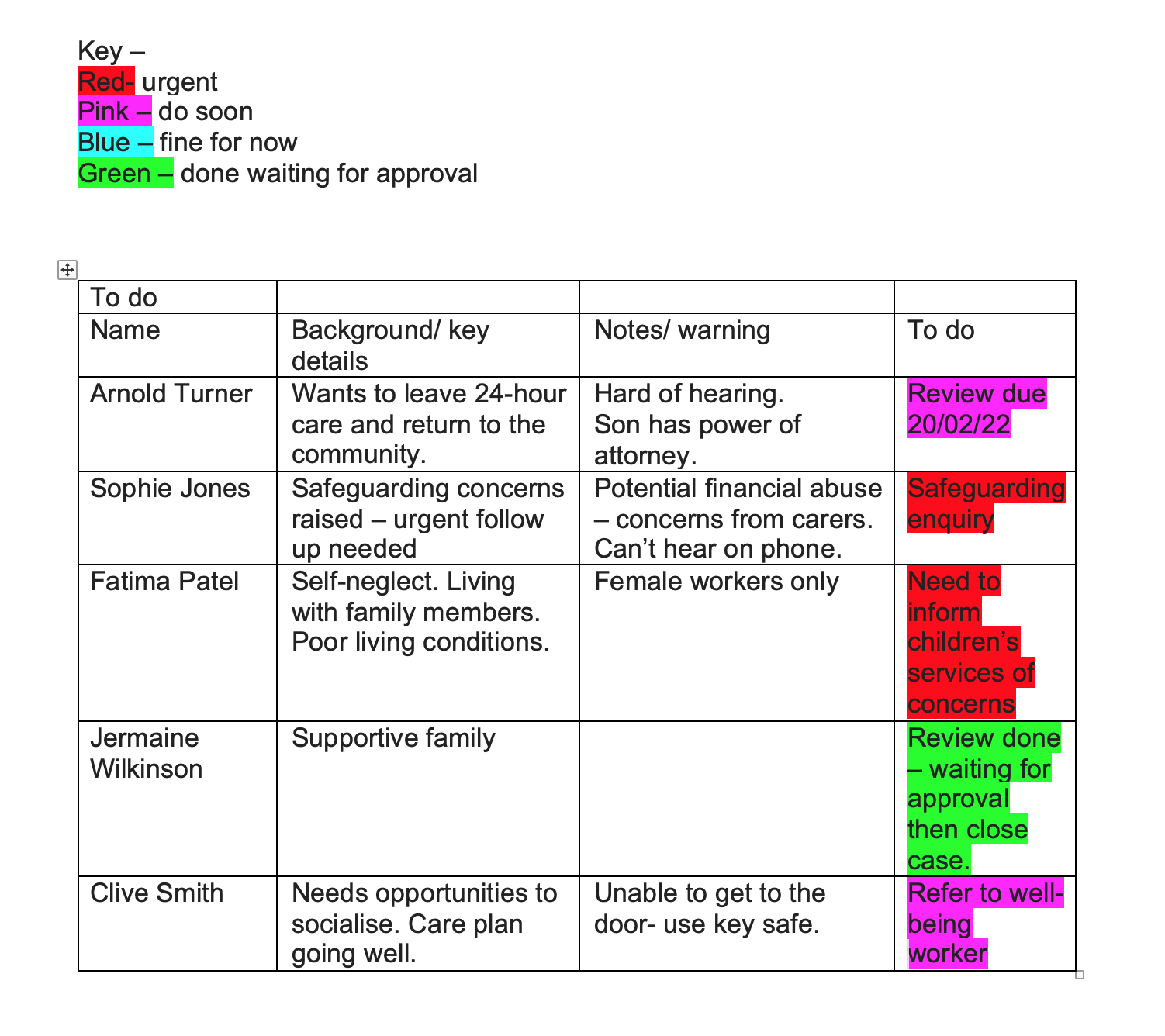
I learnt early on that social work can easily control you if you let it. I would often find myself losing focus, answering every call, and checking emails the second they came in, even at the expense of taking a toilet break or keeping hydrated! I would move from writing assessments to making calls and this, along with neglecting my basic wellbeing, would lead me to feel fatigued, especially by the end of the day.
Time-batching
Something that helped me was implementing time-batching into my daily routine wherever possible. This involves trying to group similar tasks to improve focus and productivity. I find that assessments tend to be the most intensive tasks, taking a lot of thought processing, and if I mix writing these with phone calls in between, it seems like they never get done.
Considering this practically, I know that the beginning of the day is when I feel most refreshed and focused, which is why I schedule assessments at the start of the day.

Kayleigh Rose Evans © KRE
This also works well as I am a social worker on an adults’ community team and a lot of times I am calling or visiting care homes where they don’t want to speak to me until after breakfast! You can’t always follow this plan, but I have found it useful to keep in the back of my mind.
The book Eat That Frog by Bryan Tracy has also been helpful because it suggests tackling our most urgent tasks first to avoid experiencing increased anxiety and reduced productivity.
I put this to the test and found that it applies to my experience with social work. I find disputes around finances challenging, especially if I feel like the person on the other end of the phone is trying to trip me up or is taking notes about everything I am saying.
As a result, I would often find myself leaving the task I flipped this around and started focusing on these tasks earlier wherever possible, which has transformed my practice. I noticed that as soon as that task was out of the way, I felt more motivated.
Why a ‘to-do’ list didn’t work for me
When we think about organisational strategies it’s easy for your mind to just be drawn to the classic to-do list. However, with the unpredictable nature of our profession, I question whether social work always fits this linear way of working.
Having a ‘to-do’ list can feel great on the days when you are able to get through and tick tasks off. But it doesn’t work as well when – one minute, you are concentrating on writing an assessment, then get a phone call which you need to case note and the next thing, you are flying out of the door on a crisis visit!
This often left me stuck with a load of incomprehensible notes on various pages, even when my list was well-intentioned and neat at the outset. It also led to a sense of confusion with what order to do things in as everything seemed urgent, and this led me to feel overwhelmed and that I was never achieving enough.
My light-bulb moment
I found that categorising the information helped me to feel empowered and in control, safe in the knowledge that every commitment I have made and task yet to finish will be achieved.
Below is the template I use, with pseudonyms and false scenarios to indicate my system. I adjust this template over time, depending on the priorities of my role. This template has helped me a lot as I genuinely was concerned that I couldn’t do social work if I didn’t find a way to remember all the information I was juggling! Hopefully, this stimulates thoughts for you to develop your own trusted system.

Ⓒ Kayleigh Rose Evans
Colour-coding system
The colour-coding system helps to prioritise work. If some cases are progressing well in the ‘fine for now’ column, it can create the headspace to look at those that need to be prioritised, in the red and pink section.
Allowing flexibility is a requirement because situations quickly change and therefore, it can be adjusted through the day, as unexpected events happen. The template is also a useful tool that allows you to reflect on why you may feel overwhelmed on certain days. If you have lots of ‘reds’, it may indicate that you need to get some support.
I try and leave myself a short period to update this table each day, which may seem like a waste of time but in reality, I am far more effective when using it. It also promotes my wellbeing as it means that I don’t have to keep as much in my head, providing a cut-off at the end of the day.
It’s a working document which I save a copy of and date each day. The reality is that I don’t always have a chance to do this daily, but even if left until the end of the week, it works as a tool to run through and trigger my memory from the process of updating it whenever I can.
No one-size-fits-all solution
There is no one-size-fits-all approach to organising a large and complex caseload in social work. It’s an individual thing and depends on what you are doing and how you work best. It’s also not to minimise the extent to which it is impossible to manage an unworkable workload but under the right circumstances, with appropriate support in place, I hope this can help people think about strategies for thriving in contemporary practice.
Want to read more career development tips, from Kayleigh and other social work peers? Check out our Careers Zone
Kayleigh provides more tips for practitioners and students on her YouTube channel.


 Facebook
Facebook X
X LinkedIn
LinkedIn Instagram
Instagram
I think it’s also important to consider how Long a task will take. Often we don’t give ourselves enough time for a reflective analysis on a report or to capture important information for case recording. I use my outlook calendar to timetable my work so I have a realistic time slot for assessments or phonecalls, etc. Then, when something else is added to your caseload, you can justify what capacity you have as well as ensure you have given something the time it deserves…..not everything is about outcomes, it’s about quality of work, and that requires time.
Interesting I came across similar issues, even though I am organised focused and used my time well. Some how in social work the traditional to do list just don’t cut it. And I needed to find another way. And I did, using colours to code only essential tasks. And group similar tasks together. Helps to ensure tasks are not missed.
Time batching is important.
If I have a lot of contracts and financial stuff to do I will do it all together. That way I’m only searching for the correct figures and forms once, and not several times a week.
This is a fab read! And very relatable. I find all of the above is very much what is working for me right now too.
I do find a to do list works for me, but i only put 3 or 4 realistic tasks on it that I know are achievable that day.
Its been a slow, work in progress career for me but I’m starting to see the light.